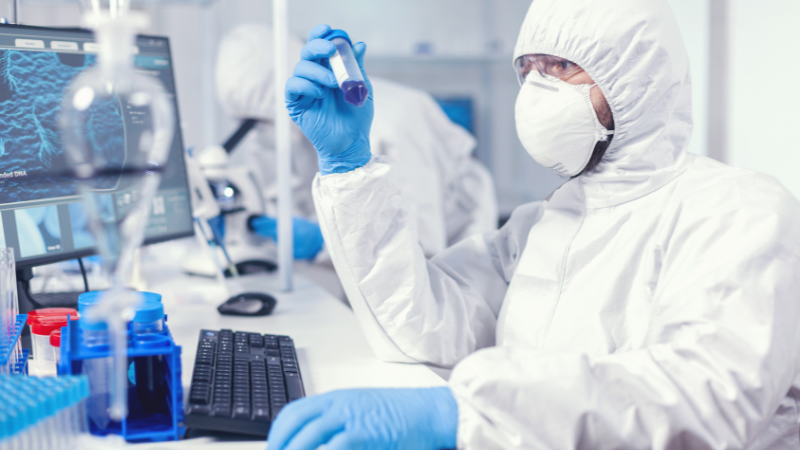What is a nuclear pharmacist and how do you become one?
04 Jan, 20233 minsNuclear pharmacy is a highly specialized area of pharmacy that involves working with radioac...

Nuclear pharmacy is a highly specialized area of pharmacy that involves working with radioactive materials for use in diagnosing and treating a multitude of diseases. In fact, it’s so highly specialized that there are only 360 certified nuclear pharmacists in the US.
If you’re interested in finding out more about what nuclear pharmacy is, or if you’d like to join this exclusive group of certified nuclear pharmacists and want to learn more about how to become a nuclear pharmacist, then read on.
What are nuclear pharmacists and what do they do?
As the job title suggests, nuclear pharmacists deal with radioactive medicines, or radiopharmaceuticals, that aren’t commercially available to the everyday Joe. Most nuclear pharmacists will fulfil some general pharmacist responsibilities such as dispensing and filling prescription orders, but there are some specialized tasks that would typically only be carried out by nuclear pharmacists. This includes:
Ordering, receiving and controlling radiopharmaceuticals and any specialist equipment required for fulfilling the role of a nuclear pharmacist
Assisting in the transport of radiopharmaceuticals
Testing of all equipment to ensure it meets the required quality standards for nuclear pharmacy
Ensuring radioactive medicines are stored correctly
Preparing patients before they are administered with the radiopharmaceutical medicines
Responding to any unexpected outcomes or side effects from radiopharmaceutical treatments.
Additionally, some more experienced nuclear pharmacists may be involved in clinical trials and testing of new radiopharmaceuticals.
Where do nuclear pharmacists work
Nuclear pharmacists typically work in one of two settings: commercial or institutional.
Commercial locations are usually private pharmaceuticals business that have a nuclear pharmacy or lab onsite. In this setting, nuclear pharmacists will create radiopharmaceuticals that are then sent out to hospitals and clinics where they are administered to patients.
Then the nuclear pharmacists working in an institutional setting are those in hospitals and clinics who actually prepare the radiopharmaceuticals to be administered to patients.
In both settings, nuclear pharmacists almost always work in enclosed labs that aren’t accessible to the general public. This is due to the hazardous nature of the radioactive material nuclear pharmacists work with. Nuclear pharmacists wear a lot of protective equipment and undergo a lot of training on handling hazardous materials, to protect them from radioactive substances.
How to become a nuclear pharmacist
To specialize as a nuclear pharmacist, you do need to complete some training in basic areas of radiation protection, radiation biology, some maths that's related to radioactivity decay, radiation physics and instrumentation and radiopharmaceutical chemistry. In addition to course work studies, you will undertake some practical training in a nuclear setting. Below listed are the steps taken to become a nuclear pharmacist:
Complete an undergraduate degree in a subject related to pharmacy. This could be maths, physics, biology, chemistry or something similar. Some schools offer dedicated pharmacy programs, while others may allow students to take nuclear pharmacy as a minor.
Complete a Pharm D. graduate program – after earning your undergraduate degree, you will need to complete a Doctor of Pharmacy degree. These first two steps are required for becoming any type of pharmacy.
Once you’ve graduated, typically you will carry out a pharmacy residency – a one to two year program where graduate pharmacists can gain practical experience of working as a pharmacist. If you want to become a nuclear pharmacist, you can apply specifically for a residency in nuclear pharmacy, in order to learn more about the ins and outs of nuclear pharmacy and gain invaluable experience in nuclear pharmacy labs.
Then, as with any type of pharmacy, after completing your residency, you will need to be licensed by a state licensing board. To do this, pharmacists must take two exams – the Multistate Pharmacy Jurisprudence Exam and the North American Pharmacist Licensure Exam.
Once you are fully qualified and licensed, you will be able to begin gaining experience in nuclear pharmacy settings. But if you want to join that elite group of around 360 certified nuclear pharmacists in the US, you can attempt to achieve certification through the Board of Pharmacy Specialties. To be eligible to sit the certification exam, you must have completed all the steps above, and additionally be able to demonstrate 4,000 hours of experience in nuclear pharmacy. For the full list of eligibility requirements, check out the BPS website.
After passing the BPS exam, they are officially allowed to refer to themselves as a Board-Certified Nuclear Pharmacist. It may sound somewhat straight forward, but we all know the hard work that goes into every area of pharmacy, with nuclear being one of the toughest exams to pass due to the dedication needed prior to the exam.
Is there any way I can bypass some of these steps to become a nuclear pharmacist?
There are certain colleges and schools who offer an integrated nuclear study programme. However, this is simply to give you a taste of what to expect from nuclear pharmacy. These programs allow you to get a feel for the environment from age 18-25 alongside several other pharmacy specializations to then go on to choose the one that suits you best. This can be a great option for those who simply have no idea which pharmacy profession would suit them.
In any case, to become a certified nuclear pharmacist, you would still need to complete all the above steps.
What is the average nuclear pharmacist salary
While average salaries can vary significantly state to state and city to city, nuclear pharmacists earn on average $147,072 in the USA, according to salary.com. This is somewhat higher than the average for pharmacists in general, which stands at $128,570, according to the Philadelphia College of Osteopathic Medicine.
We wish you the best of luck with your Pharmacy career and if you choose to pursue a career as a nuclear pharmacist, you’ll be joining a very strong team of specialist pharmacists.
If you’d like to hear about our nuclear pharmacy roles, or pharmacy recruitment in general, be sure to drop Quad Recruitment an email on info@quadrecruitment.com.




